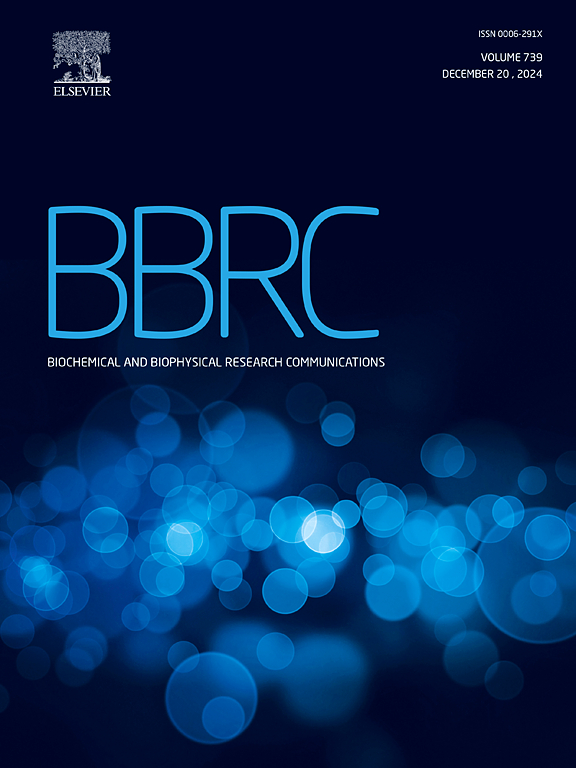IRF3-p300 axis controls global acetylation and mitotic progression
IF 2.5
3区 生物学
Q3 BIOCHEMISTRY & MOLECULAR BIOLOGY
Biochemical and biophysical research communications
Pub Date : 2025-06-14
DOI:10.1016/j.bbrc.2025.152211
引用次数: 0
Abstract
Accurate mitotic progression depends on precisely regulated post-translational modifications, including lysine acetylation, but the upstream mechanisms governing acetylation during mitosis remain unclear. Here, we identify the IRF3–p300 axis as a major regulator of global protein acetylation during mitosis. We show that p300 serves as the major lysine acetyltransferase active during mitosis, and its enzymatic activity is essential for proper cell division. Notably, p300 activation during mitosis requires phosphorylation and dimerization of IRF3, a transcription factor known for its role in innate immunity. IRF3 interacts with and activates p300, and depletion of either IRF3 or p300 reduces global mitotic protein acetylation and delays mitotic progression. These defects are rescued by wild-type IRF3 or p300, but not by phosphorylation- or dimerization-deficient IRF3 mutants or catalytically inactive p300. Mass spectrometry analysis reveals that the mitotic acetylome is substantially altered upon loss of IRF3 or p300, with widely overlapping subsets of non-histone proteins—many involved in RNA biogenesis and processing—being affected. These findings reveal a non-canonical role for IRF3 as an upstream activator of p300 and establish the IRF3–p300 axis as a key signaling pathway that ensures proper mitotic progression through global regulation of protein acetylation.
IRF3-p300轴控制全局乙酰化和有丝分裂进程
准确的有丝分裂过程取决于精确调节的翻译后修饰,包括赖氨酸乙酰化,但有丝分裂过程中控制乙酰化的上游机制尚不清楚。在这里,我们发现IRF3-p300轴是有丝分裂过程中全局蛋白乙酰化的主要调节因子。我们发现p300在有丝分裂过程中是主要的赖氨酸乙酰转移酶活性,其酶活性对细胞正常分裂至关重要。值得注意的是,p300在有丝分裂过程中的激活需要IRF3的磷酸化和二聚化,IRF3是一种已知在先天免疫中起作用的转录因子。IRF3与p300相互作用并激活p300, IRF3或p300的缺失都会降低整体有丝分裂蛋白乙酰化并延迟有丝分裂进程。这些缺陷可以通过野生型IRF3或p300修复,但不能通过磷酸化或二聚化缺陷的IRF3突变体或催化活性不强的p300修复。质谱分析显示,当IRF3或p300缺失时,有丝分裂乙酰基发生了实质性的改变,非组蛋白亚群广泛重叠,许多参与RNA的生物发生和加工,受到影响。这些发现揭示了IRF3作为p300上游激活因子的非规范作用,并建立了IRF3 - p300轴作为一个关键的信号通路,通过蛋白质乙酰化的全局调节确保适当的有丝分裂进程。
本文章由计算机程序翻译,如有差异,请以英文原文为准。
求助全文
约1分钟内获得全文
求助全文
来源期刊
CiteScore
6.10
自引率
0.00%
发文量
1400
审稿时长
14 days
期刊介绍:
Biochemical and Biophysical Research Communications is the premier international journal devoted to the very rapid dissemination of timely and significant experimental results in diverse fields of biological research. The development of the "Breakthroughs and Views" section brings the minireview format to the journal, and issues often contain collections of special interest manuscripts. BBRC is published weekly (52 issues/year).Research Areas now include: Biochemistry; biophysics; cell biology; developmental biology; immunology
; molecular biology; neurobiology; plant biology and proteomics

 求助内容:
求助内容: 应助结果提醒方式:
应助结果提醒方式:


